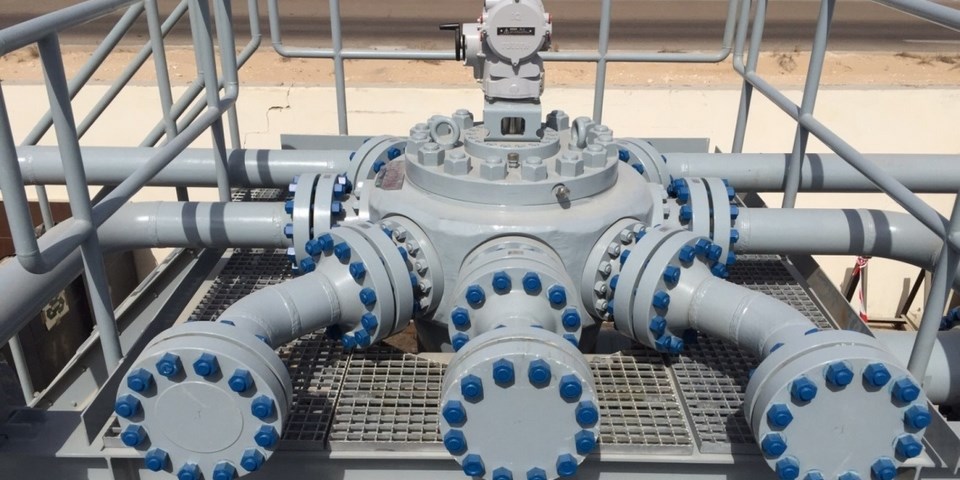Multiport selector valves (MSV) are rotary valves designed to redirect the flow of fluids or gases into different lines or process streams. Equipped with multiple ports, the valve can be selectively opened or closed to precisely direct the fluid or gas flow to various outlets as required. This allows for efficient control and management of fluids or gases in a wide range of applications.
MSVs are frequently employed in industrial applications where it is necessary to regulate numerous process streams or to mix or separate various fluids or gases. MSVs are used in the chemical processing sector to mix various chemicals or to guide process streams to other equipment, as well as in the oil and gas business to manage the flow of oil, gas, and water in a production well.
Depending on the number of ports needed, MSVs come in a range of designs, including two-way, three-way, and four-way combinations. Typically, they are run manually or by automated control systems like electric or pneumatic actuators.
Multiport Selector Valve Functions

MSVs (multiport selector valves) are critical components of process control systems, with significant application in a variety of sectors for the efficient and safe management of fluid and gas flow. MSVs provide numerous critical services in the oil and gas industry:
Flow Control: MSVs improve production efficiency by guiding fluids and gases to specific destinations via various flow routes and configurations, while minimising downtime.
Pressure Control: MSVs alter flow pathways and configurations to maintain consistent and safe operating conditions in manufacturing facilities and pipeline systems.
Fluid and gas sampling: MSVs with sampling ports make it easier to collect samples for analysis and monitoring of process conditions, which aids in quality control and decision-making.
Product Separation: MSVs allow for the separation of different goods, such as oil and gas, by redirecting their flow down discrete channels, preventing contamination and guaranteeing product integrity.
Maintenance: MSVs enable the isolation of certain pipeline segments or production facility segments for maintenance and repair. MSVs allow maintenance by directing fluid and gas flow through other channels without disturbing the overall system.
In summary, MSVs are crucial in the oil and gas industry for flow control, process optimisation, and maintenance processes. Their accurate and flexible fluid and gas flow control provides operating efficiency, productivity, and safety in production facilities and pipeline systems.
Applications of MSVs in the Oil and Gas Industry

Multiport selector valves (MSVs) find extensive applications in the oil and gas industry, serving diverse purposes such as:
Well Testing: MSVs are used in well testing to redirect the flow of oil, gas, and water from the wellbore to alternative process streams or equipment. This allows for reliable production rate measurement and well performance optimisation.
Production Separation: MSVs are critical in separating oil, gas, and water throughout the manufacturing process. MSVs promote effective production separation by directing the flow of each fluid to specific processing equipment such as separators, heaters, and pumps.
Gas Lift Systems: MSVs are used in gas lift systems to regulate the injection of gas into the wellbore. MSVs optimise the lifting process and increase overall production efficiency by selectively diverting the gas flow to numerous injection sites.
Pipeline Pigging: MSVs play an important role in pipeline pigging operations, regulating the movement of cleaning pigs through the pipeline. MSVs assist successful cleaning and maintenance processes by directing the flow of cleaning fluid and pigs to different portions of the pipeline.
Chemical Injection: MSVs are used in chemical injection systems to control the flow of chemicals into the manufacturing stream. MSVs offer focused treatment and improve operational efficiency by channelling chemical flow to specified injection locations.
Overall, MSVs play an important role in the oil and gas industry, offering dependable and efficient fluid flow control across a wide range of applications.

Working Principle of a Multiport Selector Valve
A multiport selector valve (MSV) operates by diverting the flow of a fluid or gas from one inlet port to one or more outlet ports based on the positioning of a rotating plug or spool within the valve.
The MSV typically consists of a cylindrical body with multiple ports distributed around its circumference. The number and arrangement of ports may vary depending on the specific design and application of the valve. The rotating plug or spool, located within the valve body, has channels or passages that can align with the ports.
When the plug or spool is rotated, it aligns with the selected outlet port, allowing the fluid or gas to flow through the valve and into the desired destination. The other outlet ports are closed off, preventing any flow in those directions.
The positioning of the plug or spool is usually controlled manually or through an actuator mechanism, allowing for precise and controlled flow redirection. This flexibility enables operators to direct the fluid or gas flow to various process streams, equipment, or destinations as required in different applications.
The multiple ports and channels in the MSV provide versatility, enabling the valve to handle complex flow patterns and configurations. This makes MSVs suitable for applications where fluid or gas distribution needs to be controlled and directed to multiple outlets or process streams efficiently.
Manual or automated control methods, such as pneumatic or electric actuators, can be used to operate MSVs. In manual mode, the operator turns the plug or spool with a handle or lever, whereas in automated mode, the actuator rotates the plug or spool in response to a controller signal.
Overall, the design and operation of a multiport selector valve revolve around the rotational alignment of a plug or spool with multiple ports, providing the means to selectively divert the flow of fluid or gas to desired destinations.
Understanding MSV Skids
A multiport selector valve (MSV) skid is a pre-engineered and pre-fabricated assembly that includes one or more multiport selector valves (MSVs) as well as accompanying pipework, instrumentation, and control systems. These skids are frequently employed in the oil and gas industry to provide efficient and reliable flow management, particularly in production facilities and pipeline systems.
MSV skids provide a small and standardised solution for efficient flow control, allowing for simple installation and integration with existing pipelines or process systems. The skids can be customised to accommodate several MSVs of varied designs and sizes, meeting the needs of individual processes.
An MSV skid typically includes all of the necessary components for MSV functioning, such as the valve, actuator, positioner, pressure gauges, and control panel. Additional components such as filters, regulators, and relief valves may be included to ensure correct operation and protect downstream equipment.
MSV skids’ modular design facilitates installation and decreases both time and cost when compared to traditional on-site manufacturing. These skids can be customised to fit individual process requirements and linked easily with other equipment and control systems.
In conclusion, MSV skids are practical and cost-effective options for accurate flow control in the oil and gas industry. They allow for the consistent manipulation of fluid and gas flow within manufacturing facilities and pipeline networks, improving operational efficiency and system performance.
Advantages of MSV Skids
MSV skids bring several advantages to the oil and gas industry, including:
Standardization: MSV skids provide a standardised flow control system, assuring consistent design, production, and installation. This reduces errors, increases reliability, and boosts overall system efficiency.
Standardization: MSV skids offer a standardized solution for flow control, ensuring consistent design, manufacturing, and installation. This minimizes errors, enhances reliability, and improves overall system efficiency.
Modular Design: MSV skids’ modular design allows for simple installation and smooth connection with other equipment and control systems. They are flexible and adaptable because they may be customised, adjusted, or enlarged to fit unique requirements.
Reduced Installation Time and Cost: MSV skids greatly reduce installation time and expense when compared to on-site fabrication due to pre-construction and testing in a controlled environment. Quick and simple installation reduces downtime and increases operating efficiency.
Improved Quality Control: During manufacture, MSV skids are subjected to rigorous testing and inspection to ensure consistent quality and compliance with industry standards and regulations. This improves dependability and performance while adhering to tight quality control procedures.
Precise Flow Control: MSV skids provide precision flow control, allowing precise monitoring and optimisation of fluid and gas flow in manufacturing facilities and pipeline networks. The flexibility to support numerous MSVs of varying configurations allows flexible and precise flow rate control.
In fundamental terms, MSV skids offer cost-effective, dependable, and efficient flow control solutions in the oil and gas industry. Because of their standardised design, modular flexibility, decreased installation time, increased quality control, and precise flow control capabilities, they are a useful tool in optimising operations and improving system performance.
Disadvantages of Multiport Selector Valves
While MSV skids offer numerous advantages for flow control in the oil and gas industry, it’s important to consider some potential drawbacks:
- Size Limitations: MSV skids are generally suitable for smaller to mid-size pipelines and processes. For larger systems, multiple skids may be required, introducing complexity and potentially increasing costs.
- Maintenance Requirements: MSV skids require regular maintenance and inspection to ensure proper operation and prevent downtime. The maintenance process can be more involved compared to traditional manual valves, potentially requiring specialized training or equipment.
- Customization Complexity: While MSV skids can be customized to meet specific process requirements, customization can increase costs and complexity. It may also compromise the standardization and modularity advantages mentioned earlier, necessitating careful consideration of the trade-offs.
- Cost Considerations: MSV skids can be more expensive than traditional manual valves, particularly for smaller pipelines or processes. However, the cost may be justified by improved efficiency, reduced installation time, and enhanced reliability. Conducting a thorough cost-benefit analysis specific to the application is crucial.
In summary, while MSV skids offer significant benefits, hence it’s essential to be mindful of potential limitations such as size constraints, maintenance requirements, customization complexity, and cost considerations when evaluating their suitability for a particular oil and gas industry application.
Thus, it is critical to carefully examine the process’s specific requirements and weigh the benefits and drawbacks of MSV skids in comparison to other flow control methods.
MSV Skid Manufacturers
There are several companies that manufacture MSV skids for the oil and gas industry. Some of the renowned MSV skid manufacturers include:
- Cameron
- FMC Technologies
- Emerson
- Schlumberger
- GE Oil and Gas
- ABB
- Yokogawa
- Siemens
- Honeywell
- TechnipFMC
These businesses have a solid reputation in the market for delivering high-quality MSV skids, as well as related equipment and services. However, before making a decision, it is critical to assess the process’s specific requirements and compare the capabilities and cost of each manufacturer.










